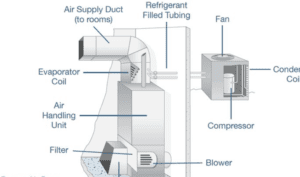Having an understanding of your HVAC system is crucial for users. This knowledge will provide you with the ability to make informed decisions about the comfort, energy efficiency, and overall health of your HVAC system in your space.
Without any wait, let’s dive into the world of HVAC and learn about it.
HVAC Components: Essential Building Blocks
To gain a deeper knowledge of your HVAC system, it is crucial to acquaint yourself with its fundamental elements. This includes:

Furnace
It is responsible for heating the air that is distributed throughout your home or building. Furnaces can be fueled by natural gas, oil, or electricity.
Air Conditioner
It is responsible for cooling the air and removing excess humidity.
Heat Pump
It is responsible for heating and cooling your indoor space.
Ductwork
It is the network of pipes that distribute cooled or heated air all over your space. Made of metal or flexible material and is installed in the walls, floors, or ceilings. Keep in mind regular ductwork cleaning and maintenance is important to prevent dust buildup, improve air quality, and maintain airflow.
Thermostat
It is the control centre of your HVAC system that sets and adjusts the desired temperature in your home or building. Comes with advanced features such as programmable settings, Wi-Fi connectivity, and energy-saving modes.
Air filters
Responsible for removing particles, dust, and allergens from the air. Comes in different types and ratings, ranging from basic fiberglass filters to high-efficiency filters. Remember to change or clean the air filters regularly to ensure proper airflow and system efficiency.
Vents and Registers
These are the points of entry and exit for the conditioned air in your space. Usually located on walls, floors, or ceilings and can be opened, closed, or adjusted to control the airflow and temperature in each room.
Hire a professional for regular dryer vent cleaning service to prevent dust and debris buildup, which can hinder airflow and reduce system efficiency.
Types of HVAC Systems: Finding the Right Fit for Your Space
There are various HVAC systems available in the market to choose from. The list includes:
Split System HVAC
It is the most common type of HVAC system consisting of two main components:
- an outdoor unit, known as the condenser which is responsible for cooling the refrigerant
- an indoor unit, known as the evaporator coil that absorbs heat from the air inside your home or business.
These components are connected by refrigerant lines, and the system uses ductwork to distribute conditioned air throughout the building.
Ductless Mini-Split Systems
These are similar to split systems but consist of an outdoor unit and one or more indoor units, which are mounted on the wall or ceiling. Connected by refrigerant lines, and each indoor unit can be controlled independently, allowing for zoned heating and cooling.
Packaged Systems
Typically used in commercial buildings or homes without a basement or attic. Combine all of the components into a single unit, which is installed either on the roof or next to the building. Packaged systems can be air-cooled or water-cooled, and they can provide both heating and cooling.
Geothermal Systems
It uses the consistent temperature of the ground to heat and cool your home or business. Consists of a ground loop, which is buried underground, and a heat pump, which is located inside the building. The ground loop transfers heat to or from the ground, depending on whether you need heating or cooling.
Window Air Conditioners
A popular choice for cooling individual rooms or small spaces. These units are installed in a window or a hole cut into a wall, and they are designed to cool a specific area.
HVAC System Functions: Balancing Comfort and Efficiency
An efficient HVAC system offers both comfort and energy savings by:
Heating: Ensuring consistent warmth for comfort in colder weather.
Cooling: Effectively cooling and dehumidifying your home during hotter seasons for a pleasant indoor temperature.
Ventilation: Maintaining healthy indoor air quality by exchanging stale air with fresh outdoor air and managing humidity.
Energy Efficiency: Operating optimally to reduce energy usage and lower utility costs when well-maintained and updated.
Tips for Maintaining Your HVAC Unit: Extend the Life of Your System
Maintaining your HVAC system is crucial for its longevity and efficiency. Here are a few proactive tips:
- Regularly clean or replace HVAC system’s air filters
- Keep the outdoor unit of your system clean
- Check and clean the evaporator coils
- Regular ductwork cleaning and maintenance
- Monitor and adjust thermostat settings
- Inspect and clean the condensate drain line
- Schedule annual system checkups
Closing Words
Empowering yourself as an owner to make informed decisions about the maintenance, and upgrades of your HVAC system requires a solid understanding of its fundamentals.
At Fresh House Air Duct Cleaning, a trusted HVAC company, we strive to facilitate informed decision-making and meet all your heating and cooling needs. Contact our team of experts to schedule an appointment for dryer ventilation cleaning service and ensure optimal performance of your system.
When you make the cleanliness of your HVAC system a priority, you are not just taking care of a boring task. Instead, you are creating a living environment that focuses on promoting health, comfort, and sustainability.

